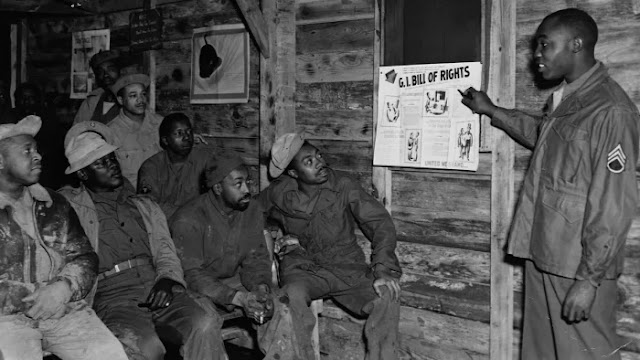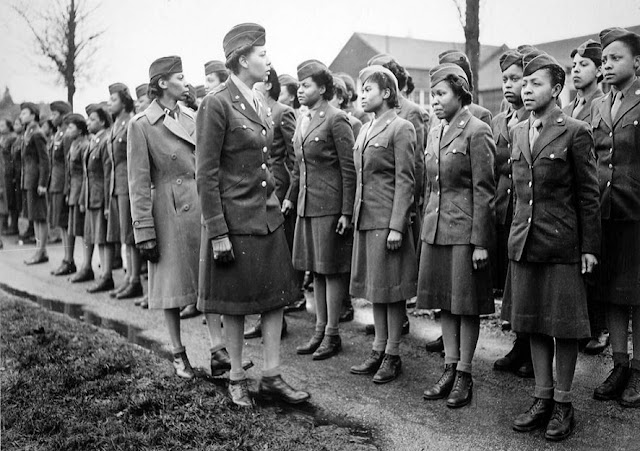Staff Sergeant Herbert Ellison explains the G.I. Bill of Rights to the African American members of the quartermaster trucking company. Library of Congress/Corbis/VCG/Getty Images
One of my proudest moments as a mom is when one of my kids as an undergrad got his essay making the case for reparations included in a philosophy textbook. Of course I read it at the time and admired it, and of course I can no longer find it in my copious archives.
Also of course we know that Black author Ta-Nehisi Coates' 2019 essay "The Case for Reparations" has become part of the canon at this point.
An excerpt:
Two hundred fifty years of slavery. Ninety years of Jim Crow. Sixty years of separate but equal. Thirty-five years of racist housing policy.
Until we reckon with our compounding moral debts, America will never be whole.
Now, in 2022, the U.S. is still far from whole and in fact becoming more fragmented every day. There's an essay in that, but what I'd like to focus on today is one of the most surprising things I learned when I still worked as a history teacher.
First group of Black members of the Women’s Army Corps assigned to serve overseas in 1945, the 6888th Central Postal Directory Battalion. (U.S. Department of Defense/National Archives)Black veterans of WWII did not receive their GI bill benefits.
Only a white person could be as incredulous as I was when I found this out rather late in life.
My own father went to college on the G.I. bill. My maternal grandfather refused to use his G.I. bill benefits as he was so digusted by the Army that drafted him and sent him into Nagasaki after destroying the city and its inhabitants with a nuclear bomb.
The original bill in 1944 was written to offer equal opportunities for all veterans to access funds for education and loan guarantees to buy homes.
Unfortunately, the states and local governments were then empowered to disburse the funds. So Black GI's were turned down when applying for tuition or home loan guarantees that white veterans were getting.
Local control often sounds good on paper but mostly, I believe, results in lack of equity and a continuation of structural racism. Black Girl in Maine blogger Shay Stewart-Bouley recently called on white "allies" to stop with the empty performances of antiracism and run for office.
The other side is increasingly joining every part of local government they can to set back Black folks but you don't know what you can do? Local election boards, school boards, see a theme here?
— Shay Stewart Bouley (@blackgirlinmain) February 3, 2022
We are beyond reading books, donating and trainings.
She's not wrong. (Full disclosure: I just made another reparations payment, albeit small, but something I do regularly. You can, too.)
In the super right wing area where I live, me getting elected is doubtful and I can no longer drive after dark anyway. These are true facts but it is also true that I would rather crawl over broken glass than sit through discussions of snow plow purchases and bus maintenance past my bedtime. Foreign policy is my thing, as progressive school curriculum was for 25 years. So, yes, I have guilt about this.
Back to the case for reparations.
What are the generational impacts of being shut out of home ownership and/or college tuition?
Just some of the long-term effects:
- Paying rent to build someone else's equity rather than your own.
- Being unable to leverage the resource of equity in real estate to educate your kids, or refinance to improve your home, or buy a car, or whatever else people do via refinancing their mortgage.
- Lack of access to jobs that require college degree(s) and have real financial benefits over the long term e.g. full coverage health care, employer contributions to retirement savings, company car, etc.
- Lack of access to generational wealth, the resource other people use to finance the costs of college and grad school, or make a down payment on a first home, or the capital to start a business.



No comments:
Post a Comment